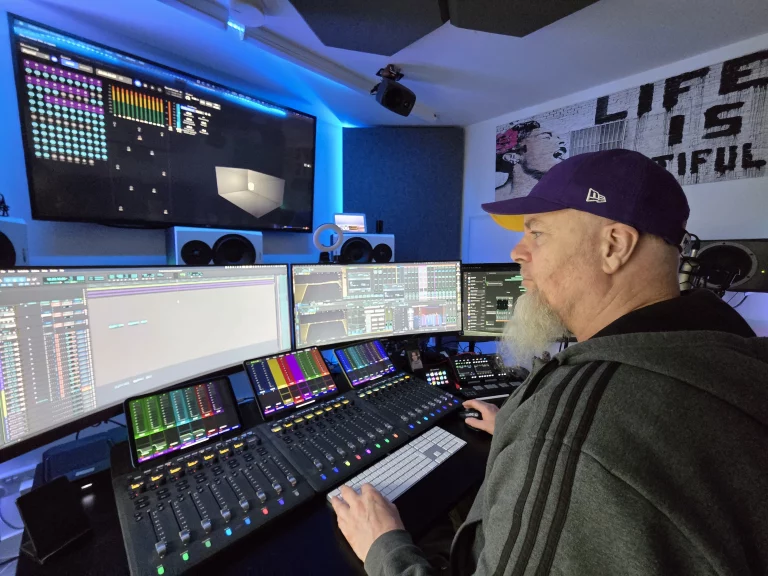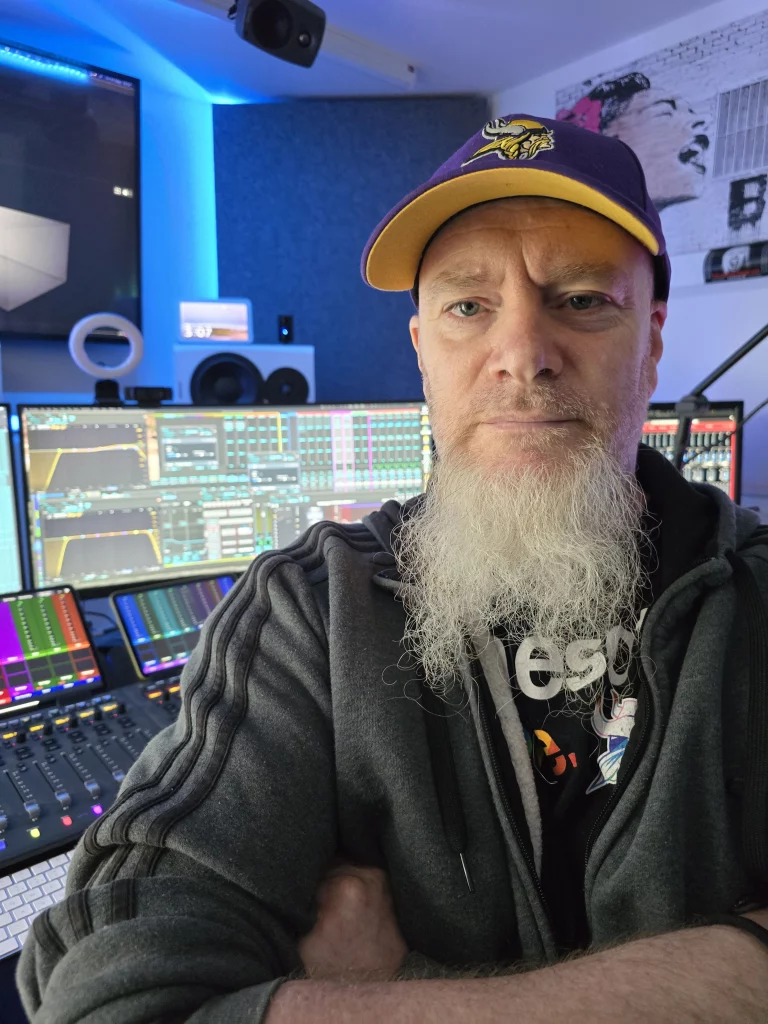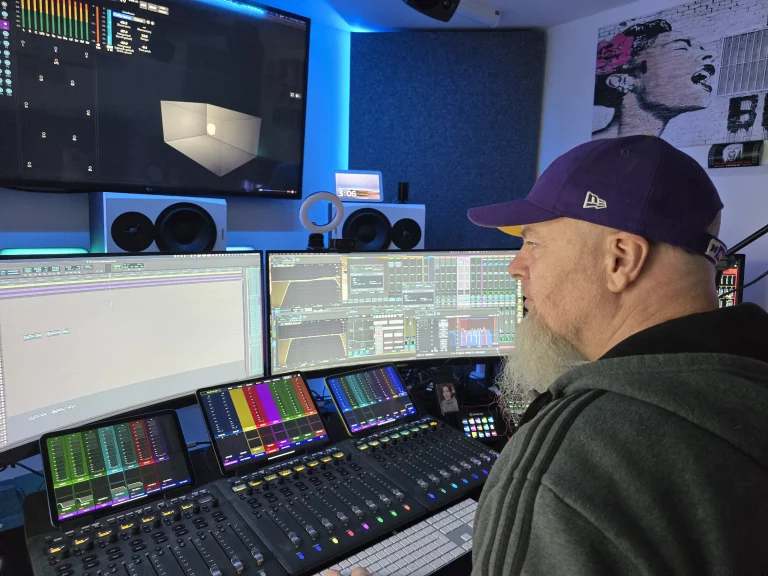Graham Kirkman On The Challenges Of Mixing For TV

Glaswegian Dubbing Mixer Graham Kirkman (AKA Luminol Audio) has worked on many TV and film projects in his impressive 25+ year career including The World According To Jeff Goldblum, Top Gear, The Apprentice, and many more.
Like many in the industry, his journey began with a passion for music, nurtured during his time in bands four decades ago. While the band he was part of never achieved commercial success, it was in the studio where Graham found his true calling. Despite facing challenges in finding paid work, Grahams’ determination remained unwavering and, after exploring other career paths, he immersed himself in television and radio production, ultimately finding his footing as an Audio Assistant at Halo Studios in London. We pick up the story from there…
So how did that journey progress to now where you've got your own audio business and you've got credits on TV shows?
I got a job as an Audio Assistant, it was a runner, but just for audio stuff. The guy that interviewed me, (he’s a mate of mine now), asked if I liked to go for a drink every now and then, I was, ‘yeah, I love it’ (I don’t drink now, but I did then). Anyway, I got the job and when I joined he said, ‘you know what got you the job?’, and I went, ‘no’, he said ‘it was that last question, it was between you and another guy and he said he didn’t drink so you got the job.’
So, I was just an Audio Assistant. I remember it being bizarre because I was 29 at this point so I’d done tons of jobs and I’d had a full-time job as an engineer, but the first day I went in and I was sort of standing there and I said to the Dubbing Mixer ‘what do I do?’ and he went, ‘well, you just wait till I’m finished’ and I went, ‘but that’s like five o’clock, what do I do before?’, and he went ‘whatever you want’. I just remember it being really weird. I felt really guilty. I had nothing to do. I made tea for the audio guys, that was once every two hours, and the rest of the time I just stood in this little MCR [master control room] bit and just read the papers. I had nothing to do.
The boss went, ‘you’ve got to go in and finish that mix’. And I went, ‘what? I don’t know how to mix!
So why were they giving you a job then if there was no work to do?
Because they had a plan to expand, which they did, into Soho Square. They needed more Audio Assistants, there was another Audio Assistant as well that was there, so there was two of us. But also, you would work all day, but the real job was at night, because in those days there was no AFs, it was conformed, so you’d go at 7 o’clock at night, 50 tapes would arrive on an EDL, on a freaking floppy disk, and you’d be on the Audiofile conforming for 12 hours. So, there was a lot of night shifts, but I worked during the day as well, it could be long hours.
Then I eventually thought I can’t sit and do nothing, this is boring, so I gave myself stuff to do. There was another suite so I sat in there and learned the AudioFile, I just read through the manual and learned it all. Eventually I got more and more involved with it and started doing some small mixes, but not much, no client things. The first day I got the client thing was the guy who was the Head of Audio, he was never sick, came down with something. The boss went, ‘you’ve got to go in and finish that mix’. And I went, ‘what? I don’t know how to mix!’ and he went, ‘you have to, he’s phoned in sick and he’s never phoned in sick. We have to finish it.’ I’ve never been so nervous in my life.
I still remember I had no clue what I was doing. Luckily he’d done most of it, so I sort of finished it and got through it and that was my first ever session. When you speak to other people, you find we’ve all nearly gone in the same way, dropped in the deep end because someone’s phoned in sick. That’s the big fork in the road that happens in your life, and if you say, no, you go in a different direction. I said, yes. Not long after that, they moved to Soho Square.
I started on a series about Longleat Safari Park. It’s still running now, 25 years later or so. I did the very first series of that, I’d hate to hear it now. It was a 50-part series or something, so I just suddenly started and then I was a Dubbing Mixer for the whole year. That was it.

Do you think that was your big break?
Yeah, 100%. I guess I could have said no, at that point I could have bottled it. I’m quite a nervous person about things like that. I always know I’ll get there in the end, but I was really nervous and I nearly didn’t do it but I remember my wife, who was my girlfriend at the time, said to me ‘you realise if you don’t do this now, you’ll be a runner for the rest of your life or you’ll be stacking shelves’, so I did it and didn’t look back, it’s all worked out.
Has most of your work been episodic TV?
Yeah, I’ve done a smattering of films, just finished one actually, but very little, I don’t enjoy doing it. I’ve done a smattering of drama, don’t enjoy doing it, it’s just not for me. So, yeah, a lot of high-end docs and low-end TV. I like doing that kind of stuff.
So now you work from a studio at home, was that a COVID thing or was that something that happened before?
No, it was just before. COVID kind of screwed it up a little bit actually, but obviously when I was working from home at first, it wasn’t really the done thing and so the client that I was working for at the time was like, we don’t really like you working from home, but we get it.
I would do pre-mixes from home that weren’t client attended and then come in, finish it at work, and then that sort of became more and more the norm, but it was just in my loft because I had nowhere else in the house. In the winter it was beyond freezing and in the summer I had to take the whole studio apart and take it into my bedroom because once it got to 30-odd degrees, it was like 700 degrees up there. It wasn’t a converted loft, just a loft where if you stepped wrong you would fall through the roof. Me and my dad put floorboards down just to cover the bit I sat in, there was no windows up there, nothing. It was so hot. I remember when my first Mac blew up. It was a fan in the Mac and it just went bump, a bit of flame came out and that was the end of it, so that just wasn’t sustainable. The only solution I had was to hire a place or get something built in the garden, and that’s what I did in the end.
..not only are the editors getting squeezed for less time to do the job, they now haven’t even got any time to do the dialogue clean up.
You’ve done a lot of the David Attenborough stuff, Top Gear, and The Apprentice, what sort of challenges are you seeing now as I hear a lot of people saying that generally the audio in post is so far down the food chain that they’re almost giving you the cleaning job?
Yeah 100%, it’s every job I do. But the funny thing is it never used to be like that and the reason I think was because we didn’t have the capability. It was a 16 track audio file, so a) you just didn’t have as many tracks to do it, and b) the editors wouldn’t supply that much, and c) the editors in those days had way more time. Nowadays, there’s just no money at all. In those days there was, so the editor would have enough time, he would have one or two days to clean up the audio so he’d go through and clear it up, and it’d be lovely. You’d get a really nice EDL, a really nice timeline that only had dialogue on the dialogue or only had music on the music.
Nowadays, that’s gone. So not only are the editors getting squeezed for less time to do the job, they now haven’t even got any time to do the dialogue clean up, so it becomes a double whammy for us. So, they put it on track one and they just leave it there, they don’t have time. So we get this mess of, ‘oh, there’s dialogue, oh, but there’s a left leg of music, where’s the right leg? Oh, down on track nine. Oh, but now it’s moved.’
Digital has made things better in so much as we’ve got amazing tools, like from Accentize and stuff like that, but we didn’t need them in the old days so much because they had a sound recordist, which they don’t have now, and they had editors who had time to edit properly and edited them like a film. There’s just no money in the game anymore.
So what are the common things you're getting? Is it noise? Is it ambiences? What are you dealing with?
Yeah. Completely recorded dialogue on camera mics. Sometimes just off the camera. No sound recordists, so quite understandably, if someone’s at a shoot, and all they’ve got time to do is just quickly set up, they’re going to set up what it looks like more than how it sounds because it has to look good otherwise you can’t use it anyway and the sound is always an afterthought, so the sound is just an absolute mess. I’ll have mics sometimes, but there’s no one monitoring it so they don’t know, so almost every job I do is some sort of recovery job, but people have become used to that.
You’d think people complain, but no, you don’t get producers coming in and going, ‘Oh, that sounds awful’. They kind of go, ‘Oh, you’ve done magic with that’. But you think ‘it still sounds like shit, mate’, but they’re just happy that they can hear what the person says. If I’d delivered something like the stuff we’re getting now 20 years ago, the whole thing would have been stopped and they’d gone, ‘right, we need to reshoot it’ because they wouldn’t have accepted that quality.
So what did you think when you first turned that knob up on Accentize’s dxRevive?
I loved it because it had the extra thing above all the others I’ve used. I still use them by the way, and in certain instances, I haven’t binned them, but some of them are better than others for certain things, but if someone said to me, you’re gonna lose all your plugins except for one noise reduction, it would be dxRevive I’d keep because it is the all-round master and it’s just magical. It gets rid of noise, but, and this is the important thing, it somehow keeps the timbre of the thing more than the others do, it keeps the body of the voice. I don’t know how it’s doing that. It’s amazing for that kind of thing. It’s absolutely amazing.
I’ve been using the new Natural mode on this massive series I’m doing now. Oh my God, it’s so good, I’m not even using others so much, just using that.
If someone said to me, you’re gonna lose all your plugins except for one noise reduction, it would be dxRevive I’d keep.
When you first got the original version, did you tend to go for the studio kind of ADR sound on the things or did you go for the more production sound?
If I’m doing a voiceover, I’ll go on Studio, but if I’m doing dialogues I’ll use the the Natural one. It’s subtle, but it’s better for dialogs
What kind of things has it fixed for you?
For normal stuff that sounds quite horrible, it can make it sound literally amazing. In fact, sometimes I’ll dial up the threshold and it’ll sound amazing and I think it shouldn’t sound this good and I dial it down until the noise starts coming back, and I think, why am I doing this? Just keep it where it is. As long as you’re filling it back up with something underneath it, and it’s not introducing artefacts. if you’ve got time to do that, it can be absolutely amazing.
So because of that, in dxRevive Pro, do you use the multi-band version where you can?
Oh yeah. If I’m doing something that’s an incredibly fast turnaround, then no, I just don’t have time, but for something like the big Atmos series I’m doing and I’ve got three days for dialogues alone which is massive, I can go through more surgically. It’s a bunch of the same people that appear in this desert, I’ve got their own surgical thing for each named person in each place, and it’s taken ages, obviously, but you have to do it otherwise you’re in too much danger of wiping stuff out you don’t want to.
Do you feel a sense of confidence now that you’ve got dxRevive, in that you're not going to be stuck with stuff that you just don't want to let out the building?
Yeah, definitely. The only thing that puts a kibosh in the whole thing is time. I start in the morning with an AAF of a mess and I’ve got to finish it by that night. These things are a godsend, but I think clients think you just press the Accentize button and all the dialogues magically work because they’ve kind of said things like, ‘but you’ve got tools that you just press’. I’m like, not really. You can’t just wipe the whole thing with the same setting, so they don’t really understand that it takes time.

Are you using it in real time or are you actually using it as an audio suite plugin?
No, never real time, because a) none of my clients have it or b) not enough of them do, so suddenly I would send a session and it wouldn’t work. They send me a session and I can’t change it. I’m not allowed to add plugins I can only subtract so I can’t go adding plugs that they don’t have and all I have is the most basic of sessions with like Waves Q10 so unless they have it specifically I can’t use it. I do the whole thing without it and then I copy everything, it’s all EQ’d and edited, and then I go through and do the noise reduction afterwards so they’ve got the original versions if they need it.
So cleaning is almost the last part of your process?
Yeah it is. I do it as I’m doing my sound effects. I’m mixing my effects last and I’m listening to the dialogues going, clean that, clean that, do this, clean that, do the effects. So yeah, I get to the end and I’ve cleaned everything, but not everyone does it. I find from a lot of my friends who get all this kind of stuff and say, you’re one of the few guys that ever does it. It’s just time. It’s not, I guess people just don’t have the time to do it. I’m sure a lot of people have dxRevive Pro. It’s not exactly expensive.
If you could go back to 16 year old Graham, what one piece of advice would you give him that you think has got you to where you are now?
It’s going to sound so big headed, but I think I do a good job and I think I do it well. I do it really quick and I know for a fact that I mostly get more stuff so clients like that. I think the advice I’d give myself is be more confident, you can do it. Even to this day, I do the job and I know I can do it, but there’s always a part of me thinks, can you though? I’ve always been like that.
Do you suffer from imposter syndrome?
Yeah. Always. I’m quite bad for that. So, it comes across negative, but it’s not. It’s just that I don’t always believe in myself. So yeah, believe in yourself more. You can do it. You can do it!

